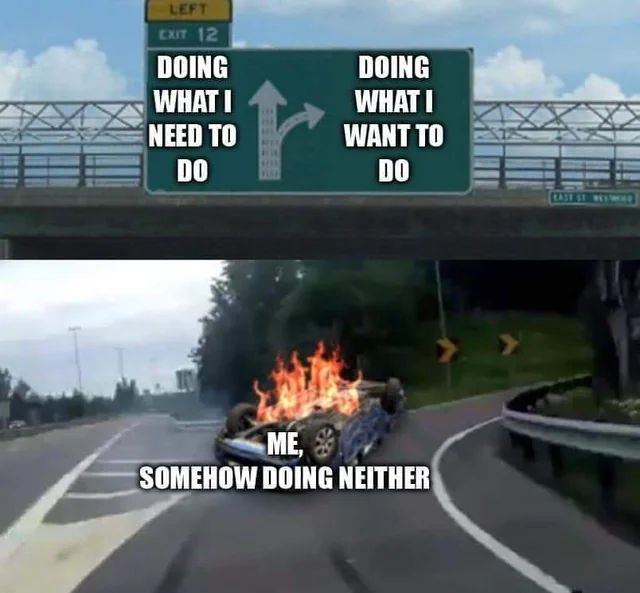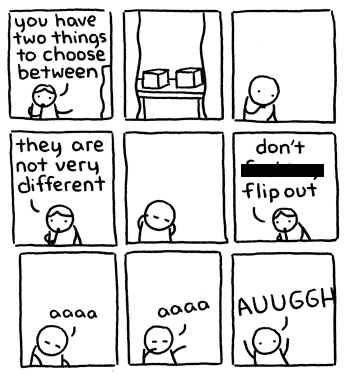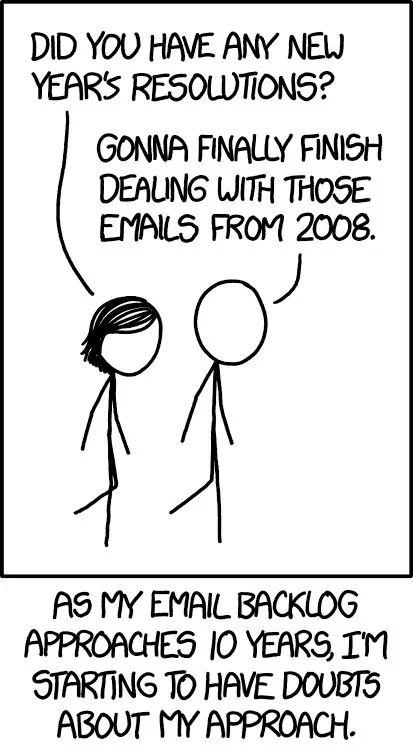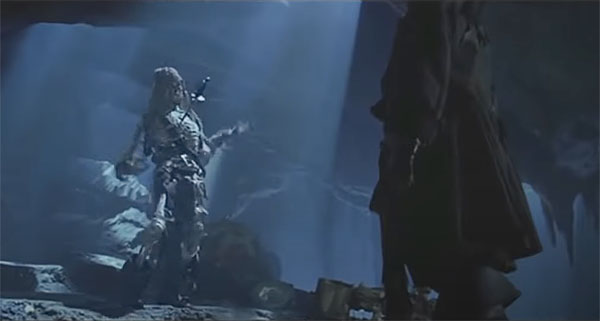One of the ways we deal with the complexity of the world is to reduce the uncountable number of things we could do to simple binary choices. This can happen so automatically that we may not even question it, and so miss out on something better.
I like to use the framework “Go big or go home… or go small” as a reminder that there is often a third choice we could make. Depending on context, different pairs of those three options will occur to us as a binary choice. I call each these three possible pairs Burindan’s Ass, Do It Badly, and Squeeze the Lemon. If you squint at those names you could figure out what I mean but let me just lay it out.
Go home by accident: Burindan’s Ass
When I first heard of Burindan’s Ass I thought it was too extreme to be a useful thought experiment. Unable to choose between two equally good food options, the animal ends up choosing neither and dies of hunger. Then I realised that I make that very same mistake – albeit with lower stakes – alarmingly regularly!
In the most direct example, I wanted to support someone on Patreon but wasn’t sure whether to do so at the $1 tier or the $4 tier. There was so little at stake, but nonetheless I couldn’t make the decision and put it off… and then forgot about it entirely. I chose to neither go big or go small, but “went home” by mistake, and – metaphorically – starved to death like Burindan’s Ass.
I’ve noticed that especially in a period of low energy on a weekend, one can consider doing some important thing like paying a bill or fixing something (go big), then feel a bit overwhelmed by it and consider doing something fun instead (go small), then feel guilty about doing the fun thing and do pretty much nothing instead (like checking social media or watching TV – go home).

Sometimes doing a small fun thing can give you the energy to do the bigger thing! And doing a fun thing is for sure better than just wasting time, just set a timer if you feel too guilty about it!
A variant on this is choosing between two “small” options, like the Patreon example above. When I was a teenager, an astrology book told me that I would have trouble deciding between similar things. Not believing in astrology but noticing that this was actually true, I got annoyed and resolved to change it. I made a series of rubrics for myself to get at this specific problem: “If you can’t tell the options apart, it can’t matter that much”; “If the consequences of choosing badly aren’t that bad, don’t sweat it”; “better to make a decision than no decision”. This helped in the end, and I can go back to not believing astrology without feeling like a hypocrite.

Don’t go home by mistake!
Going small is an option: Do It Badly
I’ve seen this phrase a few times on the internet: “If a thing is worth doing, it’s worth doing badly”. It sounds wrong, but there’s a truth to it, which is what I like about it. For example, exercise is worth doing – and some exercise is better than none. If you can’t find time to go to the gym / rock wall / tennis club, it’s worth doing exercise “badly”, i.e. just a short bit of yoga / running / stretching at home – rather than nothing.
Generalising, this is where we consider going big vs. going home and forget that we could actually go small, which is especially important to remember if we find ourselves leaning towards “go home”.
A classic example is when you consider replying to an email that will take a lot of headspace and time to write properly. Putting it off is an option, but is rarely ideal. We could instead consider sending at least a short reply acknowledging the email and letting them know we’ll get back to them later. We would probably appreciate that, much more than nothing, if we were on the other end! Or perhaps we at least take a few minutes to start the reply and then save a draft.

This goes for pretty much any task you might procrastinate on. Remembering the ‘go small’ version (such as breaking off a small bit of a big task) can help you make some progress rather than none. That small bit could be just taking the very first step, or work on the thing for x minutes – and if even that seems too hard to figure out, just taking the time to make a plan of approach! A plan that you may follow at a later date! Keep ‘going small’ until you find something you can manage. Some progress is infinitely better than none!
Going big is an option: Squeeze the Lemon
So this is kind of the opposite version of the above, and I think is more rarely applicable, but it’s very cool when you can spot those opportunities. Also having set out on this three-pairs framework I am obligated to complete it.
I heard the expression “Squeeze the lemon” in the brilliant writer’s commentary on the Pirates of the Caribbean (2001) DVD. In filmmaking, this denotes working out what is cool about your concept (in this case, cursed pirates who appear as skeletons in moonlight), and working out how to squeeze the most ‘juice’ out of that idea. In Pirates, this meant coming up with as many excuses as possible for them to walk into/out of moonlight, with a final battle taking place in a cave where they move in and out of moonbeams while swordfighting. ‘Squeezing the lemon’ is a nice way to think of the “go big” option.

In personal life, ‘going big’ can be hard to achieve, but it’s worth checking that you’re not compromising on something without even considering the bigger, better version. Instead of a 1-week holiday, could you perhaps do 10 days, 2 weeks, 3, 4?! What would it take to make that happen? Might it be worth it?
You could go to the cinema to see Avengers: Endgame, but what if you found a cinema showing Infinity War / Endgame as a double-bill, wouldn’t that be more of an adventure?

You could reply to your friend’s text message, but would a call be better? (Texting first, of course). A letter?? Have you seen them face to face lately?!
Our chances to really try metaphorical lemon-squeezing may be greater at work, depending on what we do. Is a particular business venture too much of a cop-out to really succeed? Would a much bigger version be disproportionately better? Might it be worth taking longer to make the product better? I find in business the default is to scrutinise the other direction (cutting corners, going fast and breaking things, fixing it in post), and often that makes sense – just remember to sometimes look the other way.
Go big, or go home, or go small… just make sure to consider all three.
- Transmission ends